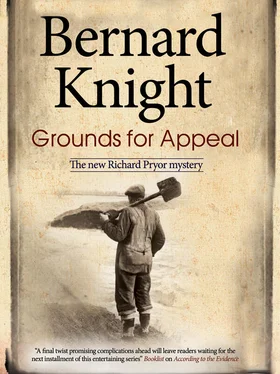Bernard Knight - Grounds for Appeal
Здесь есть возможность читать онлайн «Bernard Knight - Grounds for Appeal» весь текст электронной книги совершенно бесплатно (целиком полную версию без сокращений). В некоторых случаях можно слушать аудио, скачать через торрент в формате fb2 и присутствует краткое содержание. Жанр: Классический детектив, на английском языке. Описание произведения, (предисловие) а так же отзывы посетителей доступны на портале библиотеки ЛибКат.
- Название:Grounds for Appeal
- Автор:
- Жанр:
- Год:неизвестен
- ISBN:нет данных
- Рейтинг книги:4 / 5. Голосов: 1
-
Избранное:Добавить в избранное
- Отзывы:
-
Ваша оценка:
- 80
- 1
- 2
- 3
- 4
- 5
Grounds for Appeal: краткое содержание, описание и аннотация
Предлагаем к чтению аннотацию, описание, краткое содержание или предисловие (зависит от того, что написал сам автор книги «Grounds for Appeal»). Если вы не нашли необходимую информацию о книге — напишите в комментариях, мы постараемся отыскать её.
Grounds for Appeal — читать онлайн бесплатно полную книгу (весь текст) целиком
Ниже представлен текст книги, разбитый по страницам. Система сохранения места последней прочитанной страницы, позволяет с удобством читать онлайн бесплатно книгу «Grounds for Appeal», без необходимости каждый раз заново искать на чём Вы остановились. Поставьте закладку, и сможете в любой момент перейти на страницу, на которой закончили чтение.
Интервал:
Закладка:
He turned off at the solitary traffic lights in Cowbridge and meandered through a few lanes until he came to the tiny village of St Mary Church, not far from the huge RAF station at St Athan. On a narrow lane beyond the village, he found a gateway in a high hedge with a discreet notice proclaiming ‘Saint Illtyd’s Vineyard’, named after the fifth-century founder of the first monastic ‘university’ at Llantwit Major, a few miles away on the coast.
Driving in through the open gate, a gravel track took him to a nicely renovated farmhouse, with extensive outbuildings visible behind. He stopped on a wide turning area in front of the house and was greeted by a friendly golden retriever which ambled out of the open front door, wagging its tail as it came to have its neck patted. The dog was followed by a slim man in his mid-fifties. He wore a tweed suit with a waistcoat and a paisley-pattern cravat at his throat, his silver-grey hair covered with a matching tweed cap. Richard thought he looked very much the gentleman farmer, perhaps more typical of the Home Counties than South Wales. However, as soon as he spoke, his French origins were clear, though his English was perfect — perhaps too perfect for a native Briton.
‘Doctor Pryor, welcome to my house. It is a pleasure to meet you.’ He extended his hand and shook it warmly.
‘We get very few vine enthusiasts here, though hopefully the number will increase as more people like yourself see the light!’
He escorted Richard into the house, where he introduced his wife as they settled themselves in an elegant sitting room. Emily Dumas was a small, neat woman, some years younger than her husband, even though her hair was quite white. Dressed in a dark blue dress with a prim lace collar, she was the epitome of a quiet, respectable housewife, yet somehow Richard felt that there was deep sadness in the eyes of both her and her husband. He sensed that they shared some deep unhappiness, but it was none of his business to probe.
After some polite small-talk about the improving weather, their amiable dog and the imminent approach of Christmas, Madame Dumas vanished, then returned with a tray bearing biscuits and coffee in exquisite Limoges crockery.
‘We’ll give you taste of good Welsh wine before you leave,’ promised the husband. ‘But have this before I take you on a tour of the estate.’
As they sat and enjoyed the coffee, Richard learned that they had lived in the house for twelve years, the vines having been planted the year after their arrival.
‘Only half an acre to start with, as it was very difficult to find any vine stock during the war. We scoured market gardens to get enough, until the war ended and we could import from France,’ explained Louis.
Emily Dumas took up the story.
‘We came to Britain at the fall of France in 1940, as my husband was a senior staff-officer in the army and we escaped to London with Charles de Gaulle,’ she explained. ‘Louis worked at the Free French headquarters in Carlton Terrace, but unfortunately fell ill two years later.’
‘It was a recurrence of a tropical disease I suffered when we were in Indo-China in the thirties,’ explained her husband. ‘But I was invalided out of the army in forty-three and we ended up here soon afterwards.’
At this, Richard caught a covert glance between the man and wife, which obviously had some private significance. Then briskly, Louis Dumas stood up, full of affability, and suggested that they go outside to talk about viniculture. The next hour was a fascinating one for the pathologist, who forgot all about headless bodies and lethal stab wounds during the Frenchman’s lucid explanation of the secrets of vine-growing and winemaking. What Richard really learned was the extent of his ignorance, confirming Jimmy Jenkins’ contempt for trying to become an expert by reading books. In the winter sunshine, they toured the acres of vines, now bare of leaves and looking like desiccated twigs as they clung to the wires that supported them.
‘It’s hard to believe that in a few months, these will spring back to life and by next autumn will be loaded with fruit,’ enthused Dumas. ‘We are the first to try winemaking in Wales since the twenties, when the last vines were grubbed up not far from here.’
When Richard sought encouragement that viniculture was a practical proposition in Wales, Louis Dumas reminded him that in the past, a great deal of wine had been made all over southern Britain, by both the Romans and the monasteries.
‘That was until the climate changed for the worse in the later Middle Ages, and of course, Henry the Eighth abolished the monasteries, who were the main producers,’ he explained. ‘There was then a hiatus for centuries until the Marquis of Bute, one of the richest men in the world, thanks to Welsh coal, started a vineyard in the late nineteenth century at Castle Coch, near Cardiff. He even sent his head gardener to France to learn the secrets, though I don’t understand how he could benefit much, as he didn’t understand French! The marquis’s son planted two more vineyards in the Vale, one at St Quentin’s, just a few miles from here. They made quite a lot of wine for a few years, producing twelve thousand bottles in 1893, being the only commercial vineyard in Britain at that time. But alas, they gave up soon after the Great War.’
‘Why was that, if they were making a decent vintage?’ asked Richard, eager to learn all he could, even if only to confound Jimmy’s pessimism.
‘It was too expensive to compete with imports,’ replied Louis. ‘And they chose the wrong grape variety for this cooler, wetter climate, as their Gamay Noir was better suited to Burgundy. They should have stuck to a white wine, rather than attempt to make a good red.’
As they walked towards the end of the first row of vines, Richard saw a figure ahead of them, bending over the wires. He wore green dungarees under a brown leather jacket and had a pair of strong secateurs in one hand.
‘That’s my son Victor, checking on the ties, ready for the winter gales,’ said his father.
As they came up to him, Richard saw a tall young man in his early twenties, who straightened up when they approached. He had an angular face with a marked cleft chin and prominent cheekbones.
‘Victor, this is Doctor Pryor, who I told you about. He’s going to join the ranks of the Welsh wine makers.’
The younger man shook hands and gave Richard a pleasant smile.
‘I’m glad to hear it! Then the ranks will consist of two of us!’ he said heartily. He had none of the accent of his parents, though Richard realized that he must have been born in France before the war.
They chatted for a few moments, Victor explaining what he was doing. The vines had recently been pruned after the leaf fall, but needed tidying up and securing while dormant.
He walked back with them towards the outbuildings where the wine was made and Richard’s head began to spin as he assimilated information of the double-Guyot training system, varieties of grape and the basic principles of making the wine once the grapes had been grown.
‘Did you grow up in a winemaking area of France?’ he asked Louis, when he had a chance to get a word in.
‘I did indeed. My family came from the Loire region where the conditions are not all that unlike Britain. My father was a winemaker, but as I left to join the army when I was eighteen, I had to relearn the trade when we came here.’
From various bits of information, Richard gathered that the family still had land in France and that though the vineyard here was successful, it was far from being their only means of support. In fact, from the furnishings and many fine paintings and ornaments in the house, he felt that they were more than comfortably off. He wondered why they had chosen to remain in Britain after the war, when they could have made wine more easily in their native country. It was none of his business and he was not a nosy person by nature, though the thought occurred to him that perhaps there were political issues involved, as General de Gaulle was a controversial figure.
Читать дальшеИнтервал:
Закладка:
Похожие книги на «Grounds for Appeal»
Представляем Вашему вниманию похожие книги на «Grounds for Appeal» списком для выбора. Мы отобрали схожую по названию и смыслу литературу в надежде предоставить читателям больше вариантов отыскать новые, интересные, ещё непрочитанные произведения.
Обсуждение, отзывы о книге «Grounds for Appeal» и просто собственные мнения читателей. Оставьте ваши комментарии, напишите, что Вы думаете о произведении, его смысле или главных героях. Укажите что конкретно понравилось, а что нет, и почему Вы так считаете.












